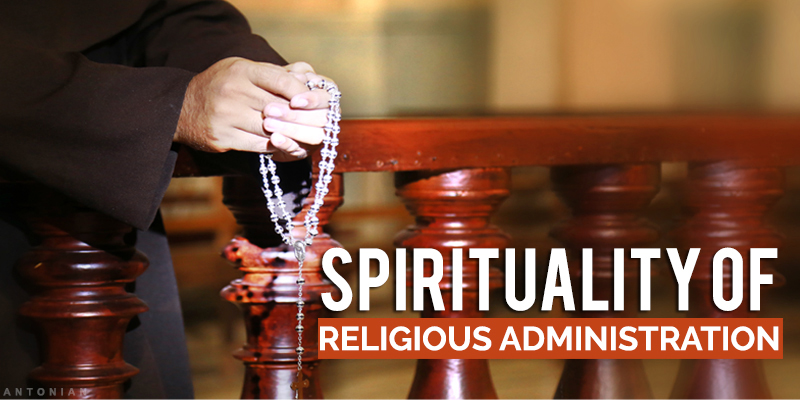
SPIRITUALITY OF RELIGIOUS ADMINISTRATION
INTRODUCTION
Since the Second Vatican Council the reality of religious administration has undergone a radical and revolutionary change. With the involvement of the religious in the social situations and the corresponding demands of efficiency and success in the Institutional administration, the religious were challenged to be equipped beyond the religious formation, on the organizational level. The religious communities, responding to these demands, have invested a lot of energy and money for the formation of suitable human resources in order to administer the institutions. Quite reasonable and justifiable indeed! However, the attention of the administration has radically shifted from persons to institutions, from effectiveness to efficiency, from witness of life to popularity and from fidelity of life to success. The result was the gain of recognition for efficient management which is an external “work”, at the cost of the credibility of “religious life” which is a reality in the heart of persons and in effect is a “ministry” and a “service”. What is required for the authentic administration is an option for the priority of persons, fidelity, witness and effectiveness as the end and the mature capacity to integrate in it the institutions, money, efficiency, success, advertisement, all as means to the end.
PERSON-CENTERED VISION
An administrator should be a person of authentic and balanced vision of religious life and mission according to proper charism. A partial or defective vision can negatively affect the quality and fruits of administrative service. A task-centered or task-oriented vision or an institution-centred or institution-oriented vision will tend to exploit the persons and their resources and their professional qualifications and expertise for the realization of the task or growth of the institution. Here the Superior who is administering becomes a task master or a manager. The result of such an administrative policy will be the successfully fulfilled tasks and prestigious development of institutions and humanly unfulfilled and spiritually exhausted lives of the dissappointed religious.
The ideal is a person-centred and person-oriented vision. The tasks, the institutions, money and the authority are at the service of a mission to be fulfilled by the community or persons. The task in this context gets the dimension of service or ministry. The administrator is the animator and patron who has identified himself/herself with the ideals of the mission and takes the members or persons at disposal sensitively and sincerely into confidence to be his collaborators and to be partners of God in Christ who is the source of the mission. In as much as the administrator succeeds in empowering the members, the tasks will be fulfilled effectively and the institutions will develop progressively. In this vision the persons involved in the administration are living a vocation meaningfully and sharing their professional quality and expertise for a service and they grow simultaneously in their spiritual life just as their service becomes an inspiring witness to the beneficiaries.
CONSCIOUSNESS OF THE MISSION
If changes have taken place in the society, it is through the persons with deep consciousness about the mission. Mission consciousness gives the administrator the capacity to place each resource that is available –persons, instituitons, money and authority- in the right position within the hierarchy of values and distinguish them according to priority as diverse means to the end.
John 20,19-21 is a source text to understand this. The risen Jesus appears to the 10 who were locked up in the room out of fear for the authorities. The message of Jesus comprises the following: greeting of peace (“peace be to you”), giving of mission (“Just as the Father send me, so I send you”), giving of Spirit (“receive the Spirit”), giving of authority (“whatever you bind on earth will be bound in heaven and whatever you loose on earth will be loosed in heaven”). The order followed by Jesus is decisively important. The disciples must enjoy peace, be aware of the mission, be open to the source of power (Spirit) to fulfill the mission and take authority as a means to fulfill the mission. Mission is first and authority is last. Many administrative collapses in religious life are caused by the reverse understanding. So mission-consciousness is the foundational attitude in the spirituality of religious administration.
CULTURE OF PARTNERSHIP
The administration is to be realized in the atmosphere of a culture of partnership. All those who are involved are considered partners by the administrator. So the relationship is expressed in a pro-active way through joint planning, decision-making and execution, by means of constant dialogue, consensus, evaluation, correction and appreciation. Partners have only one and single aim. They place themselves totally at the disposal of the achievement of the common target agreed upon. This makes the administration a synergesis and therefore enjoyable and free from destructive tension.
CONCERN FOR THE HUMAN AND SPIRITUAL WELL-BEING
The administrator, in this context, is concerned about the well-being of the partners and collaborators and not merely looking for his/her own “well off” situation. This implies a personal relationship of the administrator to the actual life of the members, their families, their concerns, preoccupations and dreams, just as their spiritual welfare.
PRAYERFUL ATTITUDE
An effective administrator, then, is a person of prayer. He admits that he is a servant of God and that his mission is “given” and hence he must be submissive to the “giver” and the real “owner” of the mission. This openness to God expressed through prayer as a life style and as a constant attitude, taking time for intensive moments of encounter with God, will make him/her humble, loving and detached from greed for money, power and pleasure. Through him/her the community will become transparent, the institutions will acquire eyes, ears and tongue, the money and success will become means for building up communion and justice. The religious administration will serve, thus as the agent of evangelization, for the establishment of the reign of God.
Share on Facebook Share on Twitter Share on Pinterest